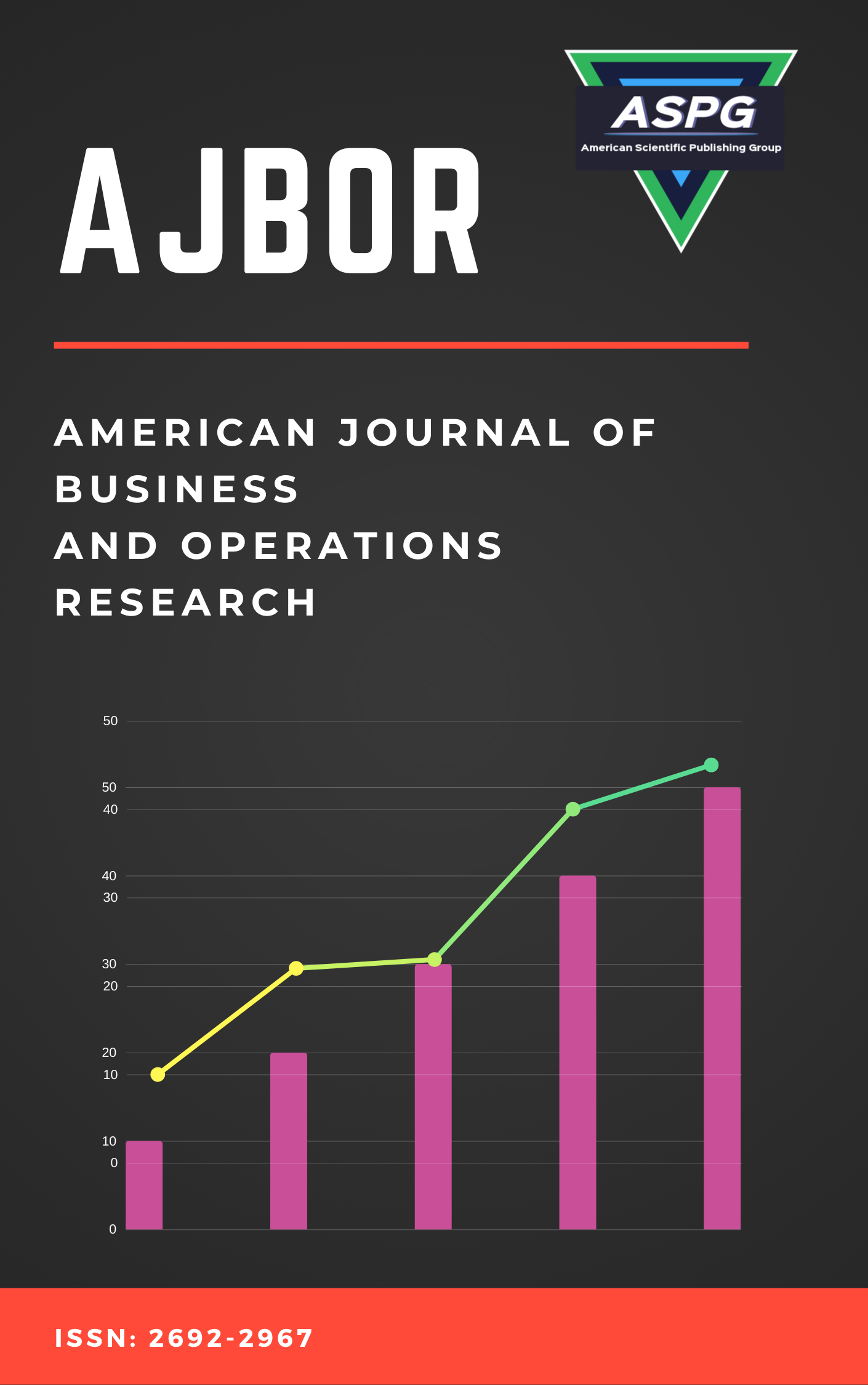

Volume 3 , Issue 1 , PP: 70-79, 2021 | Cite this article as | XML | Html | PDF | Full Length Article
Shereen Zaki 1 * , Mahmoud M. Ismail 2 , Heba Rashad 3 , Mahmoud Ibrahim 4
Doi: https://doi.org/10.54216/AJBOR.030105
Amidst the dynamic landscape of contemporary business, the integration of Business Intelligence (BI) with Customer Relationship Management (CRM) emerges as a crucial paradigm for fostering sustainable business practices. This research investigates the synergy between BI-driven CRM strategies and sustainable operations, addressing the imperative to optimize customer relationships for sustainable business growth. Leveraging models such as BG/NBD, and Gamma Gamma, and employing K-means clustering techniques, this study seeks to decode the intricate relationship between these strategies. The BG/NBD model facilitates predictions of Customer Lifetime Value (CLTV), while the Gamma Gamma model estimates the Expected Average Profit, enabling a comprehensive understanding of customer behavior. Utilizing K-means clustering aids in customer segmentation, offering insights for targeted strategies. Visualization analyses, including the Elbow Method and Silhouette Plot, guide optimal cluster determination and cluster quality assessment. Ultimately, this research underscores the potential of BI-infused CRM approaches not only to drive profitability and enhance customer relationships but also to champion sustainable business practices. The findings provide a robust framework for businesses to craft and implement BI-enhanced CRM strategies, steering them toward sustainable growth while fostering customer-centricity and profitability in modern business environments.
Customer Analytics , Data-driven Decision Making , Sustainability Strategies , , Business Insights , CRM Solutions , , , Sustainable Operations , , Business Performance Analysis.
[1] Buttle, Francis, and Stan Maklan. 2019. Customer Relationship Management: Concepts and Technologies. Routledge.
[2] Chen, Injazz J, and Karen Popovich. 2003. “Understanding Customer Relationship Management (CRM): People, Process and Technology.” Business Process Management Journal 9 (5): 672–88.
[3] Parvatiyar, Atul, and Jagdish N Sheth. 2001. “Customer Relationship Management: Emerging Practice, Process, and Discipline.” Journal of Economic \& Social Research 3 (2).
[4] Wang, Yonggui, Hing Po Lo, Renyong Chi, and Yongheng Yang. 2004. “An Integrated Framework for Customer Value and Customer-Relationship-Management Performance: A Customer-Based Perspective from China.” Managing Service Quality: An International Journal 14 (2/3): 169–82.
[5] Payne, Adrian, and Pennie Frow. 2005. “A Strategic Framework for Customer Relationship Management.” Journal of Marketing 69 (4): 167–76.
[6] Reinartz, Werner, Manfred Krafft, and Wayne D Hoyer. 2004. “The Customer Relationship Management Process: Its Measurement and Impact on Performance.” Journal of Marketing Research 41 (3): 293–305.
[7] Jayachandran, Satish, Subhash Sharma, Peter Kaufman, and Pushkala Raman. 2005. “The Role of Relational Information Processes and Technology Use in Customer Relationship Management.” Journal of Marketing 69 (4): 177–92.
[8] Winer, Russell S. 2001. “A Framework for Customer Relationship Management.” California Management Review 43 (4): 89–105.
[9] Boulding, William, Richard Staelin, Michael Ehret, and Wesley J Johnston. 2005. “A Customer Relationship Management Roadmap: What Is Known, Potential Pitfalls, and Where to Go.” Journal of Marketing 69 (4): 155–66.
[10] Verhoef, Peter C. 2003. “Understanding the Effect of Customer Relationship Management Efforts on Customer Retention and Customer Share Development.” Journal of Marketing 67 (4): 30–45.
[11] Mithas, Sunil, Mayuram S Krishnan, and Claes Fornell. 2005. “Why Do Customer Relationship Management Applications Affect Customer Satisfaction?” Journal of Marketing 69 (4): 201–9.
[12] Berry, Michael J A, and Gordon S Linoff. 2009. Data Mining Techniques. John Wiley \& Sons.
[13] Grönroos, Christian. 2007. Service Management and Marketing: Customer Management in Service Competition. John Wiley \& Sons.
[14] Ray, Gautam, Waleed A Muhanna, and Jay B Barney. 2005. “Information Technology and the Performance of the Customer Service Process: A Resource-Based Analysis.” MIS Quarterly, 625–52.
[15] Peppers, Don, and Martha Rogers. 2016. Managing Customer Experience and Relationships: A Strategic Framework. John Wiley \& Sons.
[16] Bocken, Nancy M P, Samuel W Short, Padmakshi Rana, and Steve Evans. 2014. “A Literature and Practice Review to Develop Sustainable Business Model Archetypes.” Journal of Cleaner Production 65: 42–56.
[17] Joyce, Alexandre, and Raymond L Paquin. 2016. “The Triple Layered Business Model Canvas: A Tool to Design More Sustainable Business Models.” Journal of Cleaner Production 135: 1474–86.
[18] Grönroos, Christian. 1990. Service Management and Marketing. Vol. 27. Lexington books Lexington, MA.
[19] Weichhart, Georg, Arturo Molina, David Chen, Lawrence E Whitman, and François Vernadat. 2016. “Challenges and Current Developments for Sensing, Smart and Sustainable Enterprise Systems.” Computers in Industry 79: 34–46.
[20] Meyer, Christopher, Andre Schwager, and others. 2007. “Understanding Customer Experience.” Harvard Business Review 85 (2): 116.
[21] Cardeal, Gonçalo, Kristina Höse, Inês Ribeiro, and Uwe Götze. 2020. “Sustainable Business Models--Canvas for Sustainability, Evaluation Method, and Their Application to Additive Manufacturing in Aircraft Maintenance.” Sustainability 12 (21): 9130.
[22] Ray, Gautam, Jay B Barney, and Waleed A Muhanna. 2004. “Capabilities, Business Processes, and Competitive Advantage: Choosing the Dependent Variable in Empirical Tests of the Resource-Based View.” Strategic Management Journal 25 (1): 23–37.
[23] Kleindorfer, Paul R, Kalyan Singhal, and Luk N Van Wassenhove. 2005. “Sustainable Operations Management.” Production and Operations Management 14 (4): 482–92.
[24] Payne, Adrian. 2012. Handbook of CRM. Routledge.
[25] Swift, Ronald S. 2001. Accelerating Customer Relationships: Using CRM and Relationship Technologies. Prentice Hall Professional.
[26] Jain, Rajnish, and Sangeeta Jain. 2005. “Towards Relational Exchange in Services Marketing: Insights from Hospitality Industry.” Journal of Services Research 5 (2).
[27] Boons, Frank, and Florian Lüdeke-Freund. 2013. “Business Models for Sustainable Innovation: State-of-the-Art and Steps towards a Research Agenda.” Journal of Cleaner Production 45: 9–19.
[28] Ledingham, John A, and Stephen D Bruning. 2000. Public Relations as Relationship Management: A Relational Approach to the Study and Practice of Public Relations. Routledge.
[29] Raddats, Chris, and Jamie Burton. 2011. “Strategy and Structure Configurations for Services within Product-Centric Businesses.” Journal of Service Management 22 (4): 522–39.